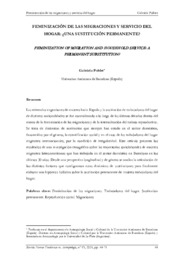Por favor, use este identificador para citar o enlazar este ítem:
https://hdl.handle.net/11000/36572Registro completo de metadatos
| Campo DC | Valor | Lengua/Idioma |
|---|---|---|
| dc.contributor.author | Poblet, Gabriela | - |
| dc.contributor.other | Departamentos de la UMH::Ciencias Sociales y Humanas | es_ES |
| dc.date.accessioned | 2025-05-14T08:27:27Z | - |
| dc.date.available | 2025-05-14T08:27:27Z | - |
| dc.date.created | 2024 | - |
| dc.identifier.citation | Revista Nuevas Tendencias en Antropología, nº15, 2024, pp. 44-71 | es_ES |
| dc.identifier.issn | 2173-0024 | - |
| dc.identifier.uri | https://hdl.handle.net/11000/36572 | - |
| dc.description.abstract | Las reiteradas migraciones de mujeres hacia España y la sustitución de trabajadoras del hogar de distintas nacionalidades se fue normalizando a lo largo de las últimas décadas dentro del marco de la feminización de las migraciones y de la internalización del trabajo reproductivo. Se trata de dinámicas de sustitución que siempre han estado en el sector doméstico, favorecidas por el género, la estratificación social y en el caso de las trabajadoras del hogar migrantes internacionales, por la condición de irregularidad. Este artículo presenta los resultados de una investigación etnográfica sobre las trayectorias sociolaborales de mujeres migrantes latinoamericanas que han trabajado en el sector doméstico en Barcelona en los últimos 30 años. Desde una perspectiva longitudinal y de género se analiza la articulación de los distintos factores que configuraron estas dinámicas de sustituciones para finalmente elaborar una hipótesis holística sobre la sustitución permanente de mujeres trabajadoras del hogar. | es_ES |
| dc.description.abstract | The repeated migrations of women to Spain and the substitution of domestic workers of different nationalities have become normalized over the last decades within the framework of the feminization of migrations and the internalization of reproductive labour. These are substitution dynamics that have always been in the domestic sector, favoured by gender, social stratification and, in the case of international migrant domestic workers, by irregular status. This article presents the results of an ethnographic research on the socio-labour trajectories of Latin American migrant women who have worked in the domestic sector in Barcelona in the last 30 years. From a longitudinal and gender perspective, the articulation of the different factors that shaped these replacement dynamics is analysed to finally develop a holistic hypothesis on the permanent substitution of women domestic workers. | es_ES |
| dc.format | application/pdf | es_ES |
| dc.format.extent | 28 | es_ES |
| dc.language.iso | spa | es_ES |
| dc.publisher | Universidad Miguel Hernández de Elche | es_ES |
| dc.rights | info:eu-repo/semantics/openAccess | es_ES |
| dc.rights | Attribution-NonCommercial-NoDerivatives 4.0 Internacional | * |
| dc.rights.uri | http://creativecommons.org/licenses/by-nc-nd/4.0/ | * |
| dc.subject | Feminización de las migraciones | es_ES |
| dc.subject | Trabajadoras del hogar | es_ES |
| dc.subject | Sustitución permanente | es_ES |
| dc.subject | Reproducción social | es_ES |
| dc.subject | Migraciones | es_ES |
| dc.subject | Feminization of Migrations | es_ES |
| dc.subject | Domestic Workers | es_ES |
| dc.subject | Permanent Substitution | es_ES |
| dc.subject | Social Reproduction | es_ES |
| dc.subject | Migrations | es_ES |
| dc.subject.other | CDU::3 - Ciencias sociales | es_ES |
| dc.title | Feminización de las migraciones y servicio del hogar: ¿una sustitución permanente? | es_ES |
| dc.title.alternative | Feminization of migration and household service: a permanent substitution? | es_ES |
| dc.type | info:eu-repo/semantics/article | es_ES |

Ver/Abrir:
Feminizacion de las migraciones y servicio del hogar.pdf
283,1 kB
Adobe PDF
Compartir:
 La licencia se describe como: Atribución-NonComercial-NoDerivada 4.0 Internacional.
La licencia se describe como: Atribución-NonComercial-NoDerivada 4.0 Internacional.
.png)